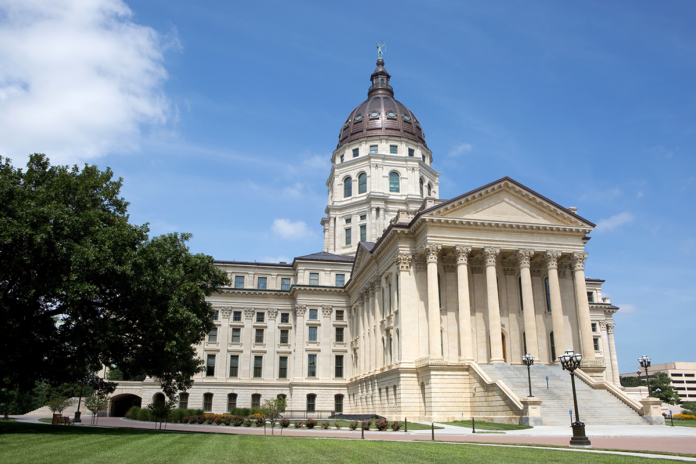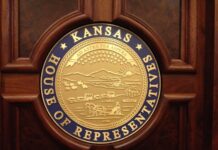(Updated: Inserts comment from bankers’ group)
A fissure has started developing in the business community over whether to endorse Republican Secretary of State Kris Kobach in the Kansas governor’s race.
This week, Kobach lost out on the endorsement of the National Federation of Independent Business, which backed former Republican Gov. Sam Brownback in 2010 and again in 2014.
However, Kobach did win support from the Kansas Bankers Association’s Political Action Committee. Kobach’s running mate, Wink Hartman, has banking interests – something that helped secure the group’s backing.
The Kobach campaign did not comment on the NFIB endorsement.
The decision by the National Federation of Independent Business to pass on the Kansas governor’s race is the first of several business endorsements that will likely be watched in the coming days.
A number of other business organizations, including the Kansas Chamber of Commerce, the Kansas Farm Bureau and the Kansas Livestock Association, haven’t announced their decisions.
Interviews with conservative sources in recent weeks have indicated that Kobach might have trouble winning business endorsements because of his position on workers compensation, illegal immigration and, to a lesser extent, limiting electric rate increases.
Others believe he’s still the best choice for business because he wants to cut income taxes, remove regulations that impede commerce and limit property value increases.
“We’ve have had a very good working relationship with Secretary Kobach in his role as secretary of state,” said Doug Wareham, president and chief executive of the bankers’ association.
Wareham said Hartman’s role as a bank executive makes the Kobach ticket attractive in the general election.
“Our association has a longstanding history of supporting bankers when they seek elective office at all levels,” he said.
Hartman “has first-hand knowledge and experience of our industry as a community banker.” he said. “That was a significant factor.”
Meanwhile, the small business group’s political action committee decided to sit out the governor’s race with its membership mixed about making an endorsement, lobbyist Dan Murray said.
While Kobach enjoyed more support from within the group than Democrat Laura Kelly, the secretary of state ran into a number of hurdles that kept him from the endorsement, he said.
Among other things, Kobach has been at odds with the organization over a 2013 law that limits the amount of money awarded to workers injured on the job.
Kobach opposed the 2013 law, which moved the state to using a newer edition of the American Medical Association guide for assessing workplace injuries. The state used the fourth edition of that guide until 2015, when it moved to the sixth edition.
Kobach has sided against some of the state’s biggest business interests such as the Kansas Chamber, SpiritAerosytems and NFIB in seeking to return to the fourth edition.
A state appeals court recently struck down the 2013 law as unconstitutional because it went too far in limiting the amount of money awarded for on-the-job injuries.
Attorney General Derek Schmidt is appealing the ruling, a move Kobach said is a mistake because he believes the state will ultimately lose at the state Supreme Court.
Kobach’s support of using the older AMA guide is popular with organized labor – he recently was endorsed a by a firefighters union – but has given the business community some heartburn.
Leading conservatives have quietly said that issue, coupled with the fact that he teamed up with Democratic lawyer Keith Mark to oppose the workers comp changes, raises concerns for business. There is some fear that Kobach might name Mark his labor secretary.
Murray said Kobach’s policy positions combined with a split membership and the fact that the secretary of state didn’t return a candidate survey on time led to no endorsement.
While NFIB has had reservations with some of Kobach’s approaches to dealing with illegal immigration, that wasn’t a factor in the group’s endorsement decision, Murray said.
In the past, NFIB has expressed concerns about implementing Kobach’s proposal requiring businesses to use a federal database known as E-Verify to confirm whether their employees can legally work in the country.
Kobach has promised to sign an executive order requiring state executive branch agencies to use E-Verify if he’s elected governor.
He also said he would work to get the Legislature to pass a law making E-Verify a statewide requirement.
While NFIB doesn’t oppose E-Verify outright, it has concerns that it creates additional work for small businesses and could lead to burdensome fines for unwittingly employing undocumented workers.
















